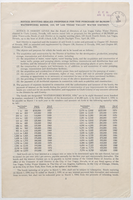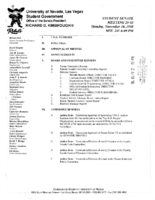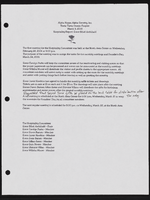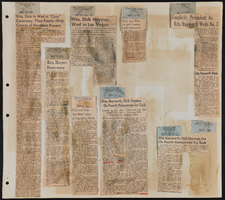Search the Special Collections and Archives Portal
Search Results
Richard Bryan oral history interviews
Identifier
Abstract
Oral history interviews with Richard Bryan conducted by Kristin Guthre on November 10, 2011 and an unknown date for the Boyer Early Las Vegas Oral History Project. Bryan begins by discussing his father’s time as a law student in Washington, D.C. and the influence his father had on his decision to pursue law. Bryan then chronicles moving to Las Vegas, Nevada in the 1940s and growing up in the Huntridge Community near Charleston Boulevard. Bryan recounts attending both the University of Nevada, Reno and the University of California, Hastings College of the Law in San Francisco, California. Bryan describes his experiences in the Las Vegas District Attorney’s office and the Army Reserve. He then recalls his political career as a member of the Nevada Senate, his role as the Attorney General of Nevada, the Governor of Nevada, and as a United States Senator. Lastly, Bryan discusses political issues in Nevada and the United States during his time in office such as debates about renewable energy, environmentalism, and preservation.
Archival Collection
Flora and Stuart Mason oral history interview
Identifier
Abstract
Oral history interview with Flora and Stuart Mason conducted by David G. Schwartz on February 27, 2010 for the Remembering Jay Sarno Oral History Project. Flora Mason begins by discussing the relationship between her family and the Sarnos. Mason describes that she and her husband socialized with Jay and Joyce Sarno in the 1960s because they lived on the same street in Las Vegas, Nevada. Stuart Mason recounts how the Sarnos were incredibly friendly and Jay occasionally invited him to play golf. Mason then chronicles his role as a contractor and the work he did for Jay Sarno throughout his career. He talks about how many of the development ventures of Sarno's were funded by Jimmy Hoffa and the Teamster’s Union. Lastly, Mason discusses how Sarno understood the gaming industry more than any other casino operator and how that was attributed to the success of Caesars Palace.
Archival Collection
Frank Scott Papers
Identifier
Abstract
The Frank Scott Papers date from 1940 to 1984 and contain promotional materials, photographs, and menus from the Union Plaza Hotel; University of Nevada, Las Vegas (UNLV) basketball memorabilia; and KRLR TV documentation, correspondence, and news clippings. The collection also contains a scrapbook and photographs of the re-opening of the Mizpah Hotel in Tonopah, Nevada.
Archival Collection

Notice inviting sealed proposals for the purchase of $8,700,000 waterworks bonds of Las Vegas Valley Water District, April 5, 1954
Date
Archival Collection
Description
Prospectus for the Las Vegas Valley Water District's $8.7 million bond issue. This notice is given pursuant to the Las Vegas Valley Water District Board of Directors resolution adopted April 2, 1954. Date stamp from E. E. Bennett
Text

Meeting minutes for Consolidated Student Senate University of Nevada, Las Vegas, November 16, 1998
Date
Archival Collection
Description
Text

Alpha Kappa Alpha Sorority, Theta Theta Omega Chapter hospitality committee reports
Date
Archival Collection
Description
From the Alpha Kappa Alpha Sorority, Incorporated, Theta Theta Omega Chapter Records (MS-01014) -- Chapter records file.
Text

Transcript of interview with Liliam Lujan Hickey by Layne Karafantis, March 18, 2010, & March 25, 2010
Date
Archival Collection
Description
Liliam Lujan Hickey is best known in the state of Nevada for being the first Hispanic woman elected to the State Board of Education as well as for the enormous contributions she made while serving from 1998 to 2000. For this, an elementary school in Clark County bears her name. Despite many obstacles, Liliam has continually dedicated herself to standing up for the causes she believes in, such as providing preschool education to the underprivileged, preparing youth to enter the workforce, helping other Hispanics run for office, and proving that with enough courage anyone can accomplish their dreams. Born in Havana, Cuba in 1932, Liliam led a sheltered life that revolved mostly around her studies at a French Dominican school. She met her first husband, Enrique Lujan, when she was only sixteen and they wed soon after. Enrique was twelve years her senior, owned many casinos on the island, and provided a luxurious existence for Liliam and their three children. However, this lifestyle abruptly changed when Castro assumed power in 1959 and Liliam and her family were compelled to relocate to the United States. In Miami, Enrique assisted other refugees financially, hoping that his wealth would remain secure in Cuba. He was wrong. This left the family destitute. In addition to casinos, Enrique had been Cuba?s coach for the Olympics. He moved the family to York, Pennsylvania, where he hoped to find work at the York Barbell Company. Liliam, who had been accustomed to having maids and nannies in Cuba, found herself doing all the housework while she also worked in a factory. The change could not have been more dramatic and the living conditions became unbearable. The family chose to move to San Diego in a Volkswagen Minivan with the hope for a better life. The next few years brought many transitions. Things did turn around in San Diego, and Liliam she recalls her years in southern California as some of the happiest of her life. Liliam found a job working at the Scripps Clinic in La Jolla. After a few years, Enrique found a job in Las Vegas and the family moved again. In Las Vegas, Liliam gave birth to her fourth child, Mary, and life once again became financially difficult for the family. In 1972, the situation grew worse with Enrique?s untimely death. Liliam was a widow at forty years of age. She had to teach herself how to drive a car, write checks, and perform financial tasks that Enrique had insisted on managing while he was alive. Determined not to give up, however, she worked tirelessly to keep the family together. Amidst all this, a friend introduced Liliam to Tom Hickey, and after a brief courtship they were married in 1981. Within a few years, Liliam became active in politics, running for the State Board of Education. Her campaign manager advised her that voters would not be receptive to photos of a Hispanic woman on billboards, and to capitalize on the name “Hickey,” which was a recognizable name because her husband was an assemblyman. She took the manager?s advice and was elected in that campaign and for two more terms, the maximum limit for the office. After the first race, she proudly displayed her face on billboards across the state. During her time at the State Board of Education, Liliam dedicated herself to helping all children receive a better education in Nevada, not only Hispanics. She co-founded the Classroom on Wheels [COW] program, which brought buses to poor neighborhoods to provide pre-school education. She established Career Day, which pairs high schools students with business professionals in an effort to help them make the transition into the workforce. While the COW program is no longer running, 8 Career Day still operates and awards scholarships in Liliam?s name annually, which helps youth receive the educational opportunities they need to succeed. And she involved Hispanic youth in Boy Scouts by bringing ScoutReach to the Las Vegas valley. Lujan Hickey worked in a wide array of other community organizations. In the 1970s, she began to work with Circulo Cubano, which later became the Latin Chamber of Commerce, and she would later belong to the National Chamber of Commerce. A longstanding member of the League of Women Voters, Liliam saw the need to get Hispanics more involved in politics in the state. Her story is one of great inspiration, and when asked why she does it, she simply replies with a smile, “I love life.” Hickey?s narrative offers the reader a glimpse of the experiences of the Cuban refugee experience in the U.S. in general. Specific to Las Vegas, it provides a rare story of the experiences of early Latinas in the political and economic development of Las Vegas in the last half of the twentieth century.
Text

"Talking Stories: A Panel of the City of Las Vegas AAPI Committee" panel discussion: transcript
Date
Archival Collection
Description
This Asian American and Pacific Islander Day panel discussion, "Talking Stories: A Panel of the City of Las Vegas AAPI Committee," features six panelists and was moderated by Allycia B. Murphy, Deputy City Attorney, Office of the City Attorney, Criminal Division. Panelists include Cynthia Leung, Chief Judge for Las Vegas Municipal Court; Jennifer Rabanes, Recreation Coordinator at Centennial Hills Active Adult Center; Patricia Cabrera, Enterprise Records Officer, City Clerk's office; Joey Boquecosa, Equipment Operator, Public Works Department; Natasha Shahani, Senior Public Information Officer; and Gai Phanalasy, Multimedia Production Specialist. The panel was held at Las Vegas City Hall on May 11, 2023, following Las Vegas Mayor Carolyn Goodman's declaration of May 11, 2023, as "Asian American and Pacific Islander Day." Anticipating the proclamation, the City's AAPI employees formed the City of Las Vegas AAPI Committee to organize the City's first AAPI Appreciation Day at City Hall. The Committee invited several local AAPI performers, organizations, and social, cultural, and advocacy groups to celebrate, honor, and recognize the City's AAPI employees across all departments.
Text

